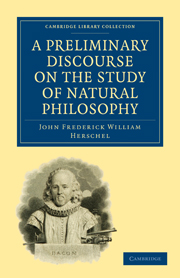Book contents
- Frontmatter
- Contents
- Dedication
- PART I OF THE GENERAL NATURE AND ADVANTAGES OF THE STUDY OF THE PHYSICAL SCIENCES
- CHAP. I Of Man regarded as a Creature of Instinct, of Reason, and Speculation. — General Influence of Scientific Pursuits on the Mind
- CHAP. II Of abstract Science as a Preparation for the Study of Physics. — A profound Acquaintance with it not indispensable for a clear Understanding of Physical Laws. — How a Conviction of their Truth may be obtained without it. — Instances. — Further Division of the Subject
- CHAP. III Of the Nature and Objects, immediate and collateral, of Physical Science, as regarded in itself, and in its Application to the practical Purposes of Life, and its Influence on the Well-being and Progress of Society
- PART II OF THE PRINCIPLES ON WHICH PHYSICAL SCIENCE RELIES FOR ITS SUCCESSFUL PROSECUTION, AND THE RULES BY WHICH A SYSTEMATIC EXAMINATION OF NATURE SHOULD BE CONDUCTED, WITH ILLUSTRATIONS OF THEIR INFLUENCE AS EXEMPLIFIED IN THE HISTORY OF ITS PROGRESS
- PART III OF THE SUBDIVISION OF PHYSICS INTO DISTINCT BRANCHES, AND THEIR MUTUAL RELATIONS
- Index
CHAP. I - Of Man regarded as a Creature of Instinct, of Reason, and Speculation. — General Influence of Scientific Pursuits on the Mind
Published online by Cambridge University Press: 29 August 2010
- Frontmatter
- Contents
- Dedication
- PART I OF THE GENERAL NATURE AND ADVANTAGES OF THE STUDY OF THE PHYSICAL SCIENCES
- CHAP. I Of Man regarded as a Creature of Instinct, of Reason, and Speculation. — General Influence of Scientific Pursuits on the Mind
- CHAP. II Of abstract Science as a Preparation for the Study of Physics. — A profound Acquaintance with it not indispensable for a clear Understanding of Physical Laws. — How a Conviction of their Truth may be obtained without it. — Instances. — Further Division of the Subject
- CHAP. III Of the Nature and Objects, immediate and collateral, of Physical Science, as regarded in itself, and in its Application to the practical Purposes of Life, and its Influence on the Well-being and Progress of Society
- PART II OF THE PRINCIPLES ON WHICH PHYSICAL SCIENCE RELIES FOR ITS SUCCESSFUL PROSECUTION, AND THE RULES BY WHICH A SYSTEMATIC EXAMINATION OF NATURE SHOULD BE CONDUCTED, WITH ILLUSTRATIONS OF THEIR INFLUENCE AS EXEMPLIFIED IN THE HISTORY OF ITS PROGRESS
- PART III OF THE SUBDIVISION OF PHYSICS INTO DISTINCT BRANCHES, AND THEIR MUTUAL RELATIONS
- Index
Summary
(1.) The situation of man on the globe he inhabits, and over which he has obtained the control, is in many respects exceedingly remarkable. Compared with its other denizens, he seems, if we regard only his physical constitution, in almost every respect their inferior, and equally unprovided for the supply of his natural wants and his defence against the innumerable enemies which surround him. No other animal passes so large a portion of its existence in a state of absolute helplessness, or falls in old age into such protracted and lamentable imbecility. To no other warm-blooded animal has nature denied that indispensable covering without which the vicissitudes of a temperate and the rigours of a cold climate are equally insupportable; and to scarcely any has she been so sparing in external weapons, whether for attack or defence. Destitute alike of speed to avoid and of arms to repel the aggressions of his voracious foes; tenderly susceptible of atmospheric influences; and unfitted for the coarse aliments which the earth affords spontaneously during at least two thirds of the year, even in temperate climates, — man, if abandoned to mere instinct, would be of all creatures the most destitute and miserable.
- Type
- Chapter
- Information
- Publisher: Cambridge University PressPrint publication year: 2009First published in: 1830

